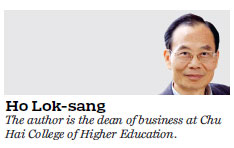Take the first step toward reconciliation and dialogue
Updated: 2019-05-15 05:52
By Ho Lok-sang(HK Edition)
|
|||||||
The recent dramas in the Legislative Council, especially that last Saturday, on which date two meetings convened respectively by the pro-establishment camp and by the "pan-democrats" were to be held in the same meeting room at about the same time, are a worrying development. A brawl between the two camps led to one legislator taken away on a stretcher bed and several others claiming minor injury. No meeting was successfully held or completed. Another meeting scheduled Tuesday also ended in chaos.
The incident came on the back of a prior meeting held exclusively among the "pan-democrats" which was declared illegal by the pro-establishment camp and which the "pan-democrats" claimed had successfully elected James To Kun-sun to preside over the debate on the fugitive law amendment.

Former president of the LegCo Jasper Tsang Yok-shing proposed that the matter should be taken directly to the general meeting of LegCo, thus bypassing the bills committee. His argument is that two meetings to elect the chairman of the bills committee had failed to do so, and more meetings will not change this scenario. Another former president of LegCo, Andrew Wong Wang-fat, disagrees. He thinks that bills committee will allow detailed discussions over each proposed provision in the amendment, and that this would not be possible with a general meeting. The same view was expressed by Honorary Chairwoman of the Liberal Party Miriam Lau Kin-yee. To her, while the move may be legally allowed, it would set a bad precedent.
All these are worrying developments that may undermine the hitherto successful implementation of the "one country, two systems" principle. To continue with the success, we need more trust: Trust between the executive and the legislative branches, trust between the Hong Kong public and the SAR government, and trust between the Hong Kong public and the central government. Trying to force the issue without building a consensus will undermine trust. It is time to take the first step toward reconciliation.
I would propose that the chief executive meet with the "pan-democrats" privately as the first step. It is not important which side initiates the meeting, but such a meeting is clearly necessary and important.
The current impasse is playing into the hands of the pro-Taiwan independence Democratic Progressive Party. DPP is hoping to see erosion of trust between the Hong Kong public and the central government. The impasse fuels its warning over "Taiwan becoming another Hong Kong" under the "one country, two systems" principle.
I also would propose that the "pan-democrats" stop demanding the retraction of the bill. They need to know that it is in the interest of Hong Kong that trust between Hong Kong and the central government grows and that "one country, two systems" works. Demanding the retraction of the bill will end any meaningful dialogue. On the other hand, proposing and demanding such mechanisms that will ensure no abuse of the extradition law will make a dialogue possible. Carrie Lam Cheng Yuet-ngor had a point when she said that a private meeting to persuade her to shelve the proposed amendment bill would be futile.
I was flattered when I heard Civic Party legislator Alvin Yeung Ngok-kiu cited me in his criticism of Lam on the radio. He charged the chief executive with not listening to the people, "not even Professor Albert Chen Hung-yee, not even Prof Ho Lok-sang..." Because Prof Chen and I have proposed ways to get around the problem of mistrust, it does seem that he was open to amending the amendment bill with a view to passing it provided that the necessary reassurances were added.
Hong Kong has extradition arrangements with different jurisdictions; and the mainland has signed extradition treaties with at least 40 countries, including France, Portugal, South Korea, and Spain. Although Canada does not have an extradition treaty with China, fugitive entrepreneur-cum-smuggler Lai Changxing was deported to China in 2011 upon promises that he would not be executed. He was eventually convicted of smuggling and bribing government officials and sentenced to life imprisonment in 2012.
There is no denying that the rule of law on the mainland has improved by leaps and bounds over the past 10 years, but there is also no denying that there is still much room for improvement. From this perspective, there may well be a silver lining in the confusion over the fugitive law amendment bill. The mainland authorities may reexamine the legal system and take steps to further increase transparency, accountability, and improve standards and procedures. It will be a blessing in disguise if central authorities use this opportunity to further elevate the country's international standing in the rule of law.
According to the US News' 2019 Best Country Ranking, China now stands at 16th among 80 countries, ahead of Belgium and after Singapore. This is up from the 20th place last year. In the Citizenship sub-ranking, China is at the 41st place - just at the middle among the 80 countries ranked. A further improvement in the rule of law will help push China to the top 10 best countries in the world, and that certainly will inspire trust.
(HK Edition 05/15/2019 page7)